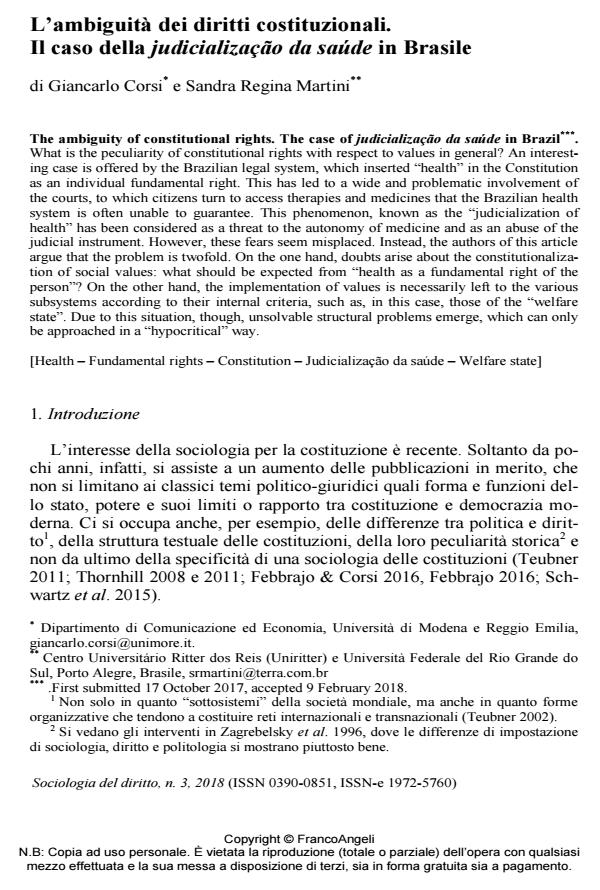The ambiguity of constitutional rights. The case of judicialização da saúde in Brazil
Journal title SOCIOLOGIA DEL DIRITTO
Author/s Giancarlo Corsi, Sandra Regina Martini
Publishing Year 2018 Issue 2018/3
Language Italian Pages 16 P. 29-44 File size 478 KB
DOI 10.3280/SD2018-003002
DOI is like a bar code for intellectual property: to have more infomation
click here
Below, you can see the article first page
If you want to buy this article in PDF format, you can do it, following the instructions to buy download credits

FrancoAngeli is member of Publishers International Linking Association, Inc (PILA), a not-for-profit association which run the CrossRef service enabling links to and from online scholarly content.
What is the peculiarity of constitutional rights with respect to values in general? An interesting case is offered by the Brazilian legal system, which inserted "health" in the Constitution as an individual fundamental right. This has led to a wide and problematic involvement of the courts, to which citizens turn to access therapies and medicines that the Brazilian health system is often unable to guarantee. This phenomenon, known as the "judicialization of health" has been considered as a threat to the autonomy of medicine and as an abuse of the judicial instrument. However, these fears seem misplaced. Instead, the authors of this article argue that the problem is twofold. On the one hand, doubts arise about the constitutionalization of social values: what should be expected from "health as a fundamental right of the person"? On the other hand, the implementation of values is necessarily left to the various subsystems according to their internal criteria, such as, in this case, those of the "welfare state". Due to this situation, though, unsolvable structural problems emerge, which can only be approached in a "hypocritical" way.
Keywords: Health - Fundamental rights - Constitution - Judicialização da saúde - Welfare state
- Challenges for the welfare state and the right to health after the pandemic Carmelo Bruni, Matteo Finco, in Oñati Socio-Legal Series /2024 pp.691
DOI: 10.35295/osls.iisl.1844
Giancarlo Corsi, Sandra Regina Martini, L’ambiguità dei diritti costituzionali. Il caso della judicialização da saúde in Brasile in "SOCIOLOGIA DEL DIRITTO " 3/2018, pp 29-44, DOI: 10.3280/SD2018-003002